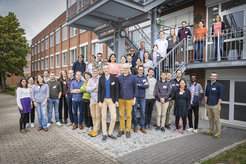Evolutionary biology meets the antibiotic crisis
Symposium on Antibiotic Resistance at the Max-Planck-Institute for Evolutionary Biology
From September 24 to 26, 2024, the second symposium on antibiotic resistance titled "Evolutionary biology meets the antibiotic crisis" took place at the Max Planck Institute for Evolutionary Biology in Plön. Organized by Professor Dr. Hinrich Schulenburg (Kiel/Plön) and Professor Dr. Jens Rolff (Berlin), the event brought together around 40 scientists from various disciplines to discuss pressing questions about the growing threat posed by antibiotic-resistant pathogens.

Experts from cities such as Zurich, Basel, Vienna, Berlin, and from northern Germany – including Plön, Lübeck, Borstel, and Kiel – participated. The group consisted of evolutionary biologists, theoretical biologists, as well as professionals from human and veterinary medicine. Notable contributions came from Annelies Zinkernagel, a clinician from Zurich and former president of the European Society for Clinical Microbiology and Infectious Diseases (ESCMID), and Zurich-based mathematicians and evolutionary biologists Sebastian Bonhoeffer and Roland Regoes. Also present were for example Annette Moter (Berlin), an expert in bacterial infections, along with Marcus Fulde and Georg von Samson-Himmelstjerna from the field of veterinary medicine, and also various members of the Plön Max-Planck Institute, such as Hildegard Uecker, Frederic Bertels, and Arne Traulsen.
Evolutionary Biology as the Key to Combating the Antibiotic Crisis
The symposium centered on the question of how evolutionary biology approaches could offer new strategies for addressing antibiotic resistance. Antibiotic-resistant pathogens are responsible for approximately 1.3 million deaths annually worldwide and indirectly contribute to a total of 5 million deaths per year. The increasing spread of resistance is rooted in evolutionary processes, which have so far been insufficiently considered in the development of new treatment designs.
The conference highlighted various innovative approaches from evolutionary biology, including the use of antimicrobial peptides, which have been part of the immune system's defense against pathogens for millions of years and against which resistance rarely evolves. Other discussions focused on exploiting evolutionary trade-offs – the costs of resistance evolution that can be strategically used in treatment. The use of bacteriophages, bacterial toxins, and antiviral substances was also a key topic of discussion.
New Perspectives through Mathematical Models
Another focus of the symposium was the application of mathematical models, which can help to analyze and optimize a wider range of treatment strategies. These models provide new insights into the factors that influence the evolution of antibiotic resistance and could contribute to the development of more sustainable therapies.
Challenges and Outlook
Despite significant insights from basic research, the practical implementation of evolution-based treatment approaches remains a challenge. Close collaborations between evolutionary biologists, mathematicians, and clinicians are essential to successfully apply these new approaches to patients.
The interdisciplinary exchange at the symposium was particularly valuable, as it generated many new ideas for research projects. Clinical studies highlighted specific resistance phenomena that had been insufficiently considered in mathematical models. This underscores the need for stronger cooperation between disciplines.
Looking Ahead: Next Symposium in Fall 2026
Due to the great success of this year's event, another symposium is already planned. It will take place in fall 2026, in the new building of the Max Planck Institute for Evolutionary Biology in Plön. The organizers anticipate exciting discussions once again and hope to make further progress in the fight against the antibiotic crisis.
